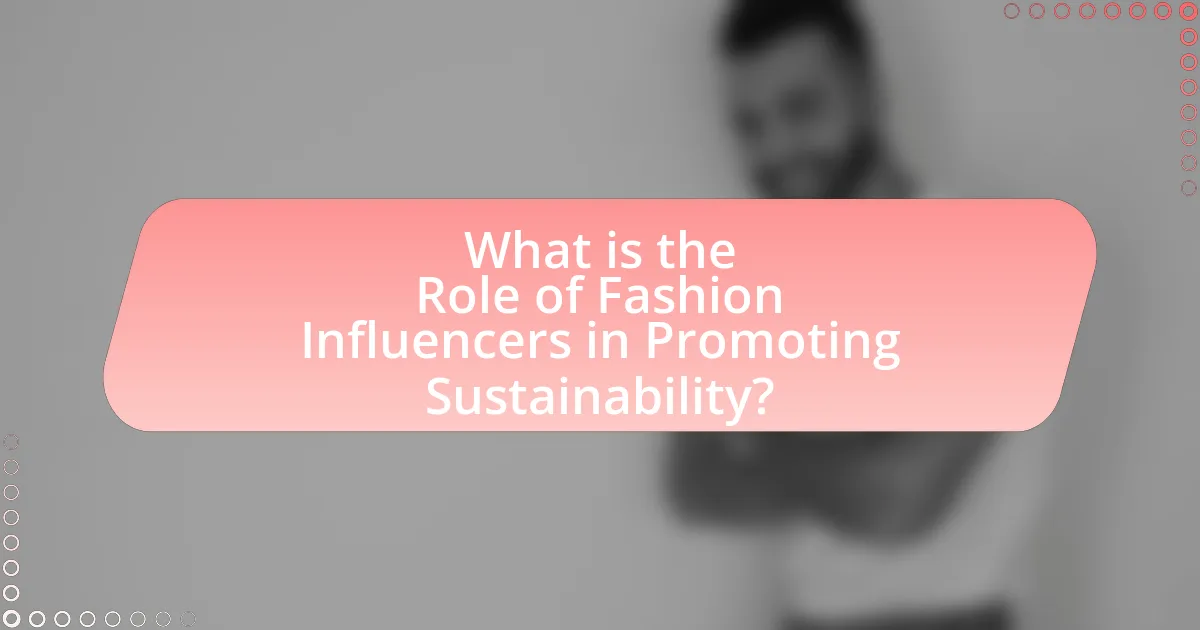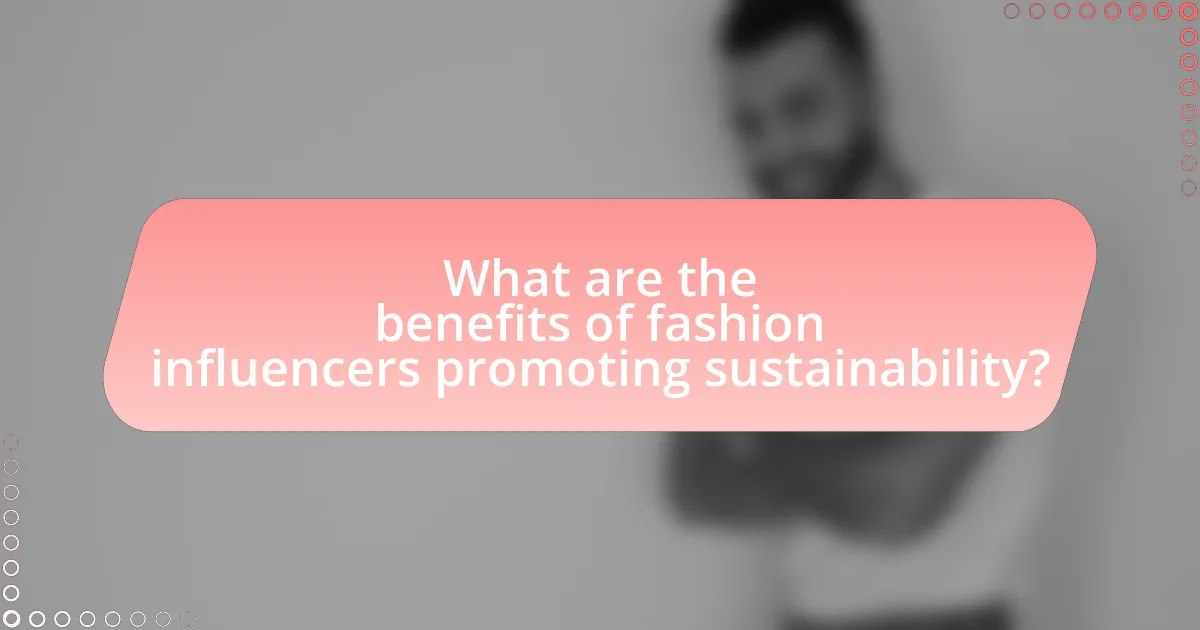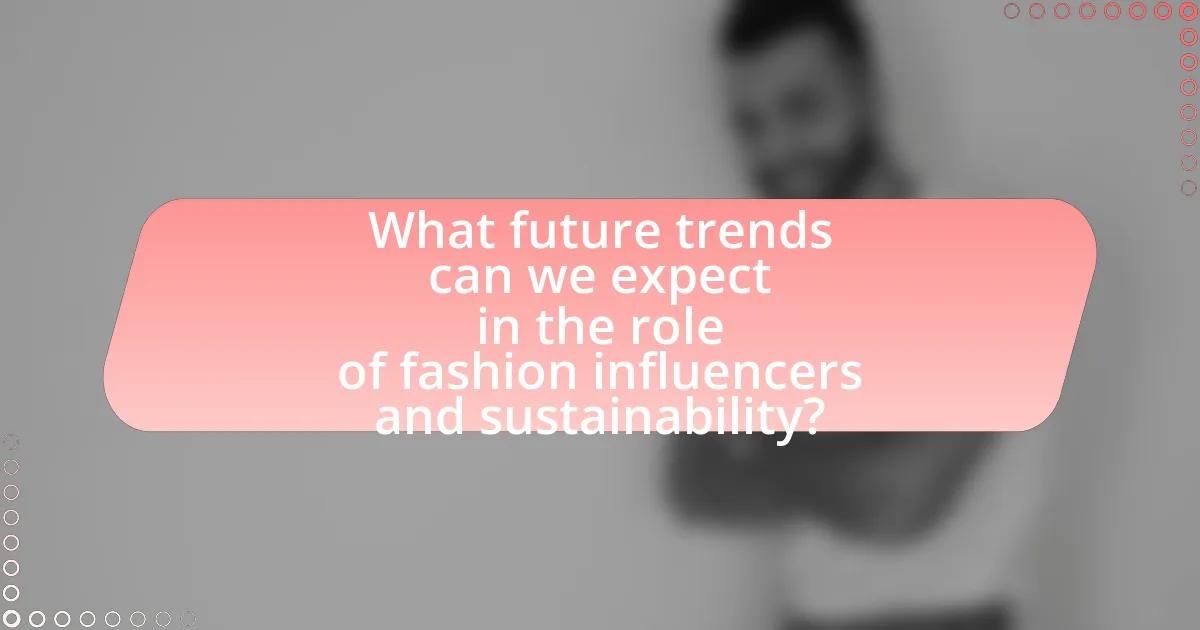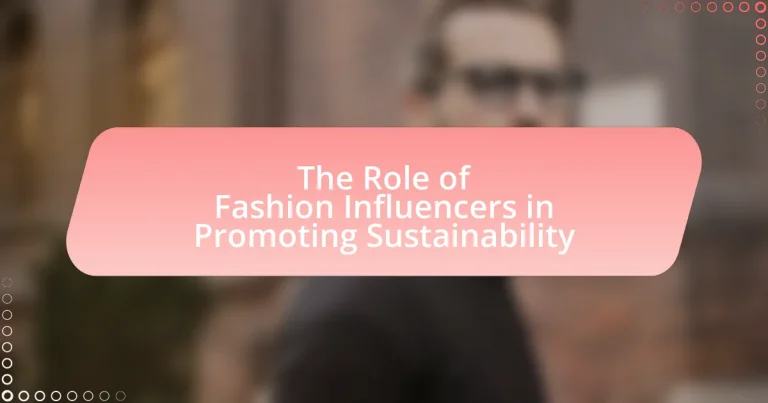Fashion influencers play a pivotal role in promoting sustainability within the fashion industry by raising awareness about eco-friendly practices and sustainable brands. They significantly impact consumer behavior by shaping perceptions and encouraging responsible purchasing decisions through authentic storytelling and personal experiences. The article explores the strategies influencers use to advocate for sustainable fashion, the challenges they face, and the misconceptions surrounding sustainable practices. It also highlights the importance of sustainability in the fashion industry, the environmental impacts of fast fashion, and the positive changes driven by influencer advocacy, ultimately emphasizing the growing consumer demand for ethical and sustainable fashion choices.

What is the Role of Fashion Influencers in Promoting Sustainability?
Fashion influencers play a crucial role in promoting sustainability by leveraging their platforms to raise awareness about eco-friendly practices and sustainable brands. They often showcase sustainable fashion choices, educate their followers on the environmental impact of fast fashion, and encourage responsible consumer behavior. For instance, a study by the Global Fashion Agenda found that 66% of consumers are influenced by social media when making sustainable fashion choices, highlighting the significant impact influencers have on consumer attitudes and behaviors. By collaborating with sustainable brands and sharing their stories, fashion influencers can effectively drive the conversation around sustainability in the fashion industry.
How do fashion influencers impact consumer behavior regarding sustainability?
Fashion influencers significantly impact consumer behavior regarding sustainability by shaping perceptions and encouraging eco-friendly purchasing decisions. Their ability to reach large audiences allows them to promote sustainable brands and practices effectively. For instance, a study published in the Journal of Business Research found that consumers are more likely to purchase sustainable products when endorsed by influencers they trust, highlighting the persuasive power of social proof. Additionally, influencers often share personal stories and experiences related to sustainability, which can resonate emotionally with their followers, further driving the desire to adopt sustainable practices.
What strategies do fashion influencers use to promote sustainable fashion?
Fashion influencers promote sustainable fashion primarily through authentic storytelling and showcasing eco-friendly brands. By sharing personal narratives about their sustainable choices, influencers create a relatable connection with their audience, which encourages followers to adopt similar practices. For instance, influencers often highlight the environmental impact of fast fashion and provide alternatives, such as thrift shopping or supporting sustainable brands. Research indicates that 70% of consumers are more likely to purchase from brands endorsed by influencers who demonstrate a commitment to sustainability, reinforcing the effectiveness of this strategy. Additionally, influencers utilize social media platforms to engage their audience through educational content, such as tips on sustainable living and the importance of ethical fashion, further amplifying their message.
How do followers perceive the messages from fashion influencers about sustainability?
Followers generally perceive messages from fashion influencers about sustainability as credible and impactful, often viewing them as a source of inspiration for adopting eco-friendly practices. Research indicates that 70% of consumers are influenced by social media when making sustainable fashion choices, highlighting the significant role influencers play in shaping perceptions. Additionally, studies show that followers appreciate influencers who authentically engage with sustainability issues, as this fosters trust and encourages them to support sustainable brands.
Why is sustainability important in the fashion industry?
Sustainability is important in the fashion industry because it addresses environmental degradation, social inequality, and economic viability. The fashion industry is one of the largest polluters globally, contributing to significant waste and carbon emissions; for instance, it accounts for about 10% of global carbon emissions and is responsible for 20% of wastewater. By adopting sustainable practices, the industry can reduce its ecological footprint, promote ethical labor practices, and foster long-term economic health. This shift not only benefits the planet but also meets the growing consumer demand for responsible and transparent production methods, as evidenced by a 2021 survey indicating that 66% of global consumers are willing to pay more for sustainable brands.
What are the environmental impacts of fast fashion?
Fast fashion significantly contributes to environmental degradation through excessive resource consumption, pollution, and waste generation. The industry is responsible for approximately 10% of global carbon emissions, primarily due to the energy-intensive processes involved in manufacturing and transporting garments. Additionally, fast fashion leads to the depletion of water resources, with the production of a single cotton shirt requiring around 2,700 liters of water. Furthermore, the disposal of cheap clothing contributes to landfill overflow, with an estimated 92 million tons of textile waste generated annually, much of which is non-biodegradable. These factors collectively highlight the detrimental environmental impacts of fast fashion.
How does sustainable fashion contribute to ethical consumerism?
Sustainable fashion contributes to ethical consumerism by promoting environmentally friendly practices and fair labor conditions in the fashion industry. This approach encourages consumers to make informed purchasing decisions that prioritize sustainability, such as choosing brands that utilize organic materials, reduce waste, and ensure fair wages for workers. For instance, a report by the Global Fashion Agenda highlights that sustainable fashion can reduce greenhouse gas emissions by 30% by 2030 if adopted widely, demonstrating its potential impact on both the environment and ethical labor practices.
What challenges do fashion influencers face in promoting sustainability?
Fashion influencers face several challenges in promoting sustainability, primarily due to the inherent contradictions within the fast fashion industry. Many influencers are often sponsored by brands that prioritize rapid production and consumption, which undermines sustainable practices. Additionally, there is a lack of transparency in supply chains, making it difficult for influencers to verify the sustainability claims of the brands they promote. Research indicates that 60% of consumers are confused about what sustainability means in fashion, complicating influencers’ efforts to educate their audience effectively. Furthermore, the pressure to maintain a visually appealing aesthetic can lead influencers to prioritize style over sustainability, creating a conflict between their personal brand and sustainable messaging.
How do commercial partnerships affect the authenticity of sustainability messages?
Commercial partnerships can undermine the authenticity of sustainability messages by introducing potential conflicts of interest and profit motives that may overshadow genuine environmental commitments. When brands collaborate with influencers or organizations primarily for marketing purposes, the resulting messages may prioritize sales over sincere sustainability efforts. For instance, a study published in the Journal of Business Ethics found that consumers often perceive messages from brands involved in commercial partnerships as less credible, particularly when the partnership is not transparently disclosed. This perception can lead to skepticism about the brand’s true commitment to sustainability, ultimately diminishing the impact of their messages on consumer behavior.
What misconceptions exist about sustainable fashion among influencers and their audiences?
Misconceptions about sustainable fashion among influencers and their audiences include the belief that sustainable fashion is always more expensive and that it lacks style or variety. Many influencers perpetuate the idea that sustainable brands are only for high-income consumers, ignoring the growing number of affordable sustainable options available. Additionally, audiences often think that sustainable fashion means compromising on aesthetics, when in fact, many sustainable brands offer trendy and diverse collections. Research from the Fashion Institute of Technology indicates that consumer perception of sustainability is often skewed by marketing narratives, leading to these misconceptions.
How can fashion influencers effectively advocate for sustainability?
Fashion influencers can effectively advocate for sustainability by promoting eco-friendly brands and practices through their platforms. By showcasing sustainable fashion choices, such as clothing made from organic materials or brands that prioritize ethical production, influencers can educate their audience on the importance of sustainability in the fashion industry. Research indicates that 66% of consumers are willing to pay more for sustainable brands, highlighting the potential impact influencers have in driving consumer behavior towards eco-conscious choices. Additionally, influencers can engage in partnerships with sustainability-focused organizations, participate in campaigns that raise awareness about environmental issues, and share personal stories about their sustainable lifestyle choices, thereby fostering a community that values and prioritizes sustainability.
What role does education play in influencing sustainable practices among followers?
Education plays a crucial role in influencing sustainable practices among followers by equipping them with knowledge about environmental issues and sustainable solutions. Through educational initiatives, followers gain awareness of the impact of their consumption choices, which can lead to more responsible behaviors. For instance, studies have shown that individuals who receive education on sustainability are more likely to adopt eco-friendly practices, such as reducing waste and supporting sustainable brands. This correlation is supported by research from the Journal of Environmental Education, which indicates that educational programs significantly enhance participants’ understanding of sustainability and their commitment to sustainable practices.
How can influencers collaborate with sustainable brands to enhance their impact?
Influencers can collaborate with sustainable brands by creating authentic content that highlights the brand’s eco-friendly practices and products. This collaboration can involve sponsored posts, product reviews, and storytelling that emphasizes the importance of sustainability in fashion. For instance, a study by the Journal of Business Research found that influencer marketing can significantly increase consumer awareness and purchase intentions for sustainable products, demonstrating that influencers can effectively amplify the message of sustainability. By aligning their values with those of sustainable brands, influencers can enhance their impact and drive positive change in consumer behavior.

What are the benefits of fashion influencers promoting sustainability?
Fashion influencers promoting sustainability significantly enhance consumer awareness and drive positive behavioral changes towards eco-friendly practices. By leveraging their platforms, these influencers can effectively communicate the importance of sustainable fashion choices, thereby encouraging their followers to consider the environmental impact of their purchases. Research indicates that 66% of consumers are willing to pay more for sustainable brands, highlighting the influence of these figures in shaping market trends. Additionally, influencers can foster a sense of community around sustainability, motivating individuals to adopt more responsible consumption habits and support ethical brands.
How does influencer marketing enhance awareness of sustainable fashion?
Influencer marketing enhances awareness of sustainable fashion by leveraging the reach and credibility of influencers to communicate sustainable practices and brands to their followers. Influencers often have dedicated audiences that trust their opinions, making them effective in promoting sustainable fashion choices. For instance, a study by the Digital Marketing Institute found that 49% of consumers depend on influencer recommendations when making purchase decisions, highlighting the significant impact influencers have on consumer behavior. By showcasing sustainable brands and practices through engaging content, influencers can effectively raise awareness and encourage their followers to adopt more sustainable fashion habits.
What metrics can be used to measure the impact of influencers on sustainability awareness?
Metrics that can be used to measure the impact of influencers on sustainability awareness include engagement rates, reach, sentiment analysis, and conversion rates. Engagement rates, which encompass likes, shares, and comments, indicate how actively the audience interacts with sustainability content shared by influencers. Reach measures the total number of unique users who see the content, providing insight into the potential audience size for sustainability messages. Sentiment analysis evaluates the tone of comments and discussions surrounding influencer posts, revealing public perception and attitudes towards sustainability. Conversion rates track the number of users who take specific actions, such as signing petitions or purchasing sustainable products, as a direct result of influencer campaigns. These metrics collectively provide a comprehensive view of an influencer’s effectiveness in raising sustainability awareness.
How do successful campaigns by influencers lead to increased sales of sustainable products?
Successful campaigns by influencers lead to increased sales of sustainable products by leveraging their credibility and reach to engage consumers effectively. Influencers create authentic content that resonates with their audience, showcasing sustainable products in relatable contexts, which enhances consumer trust and interest. Research indicates that 49% of consumers depend on influencer recommendations for their purchasing decisions, particularly in the fashion sector, where sustainability is increasingly prioritized. Additionally, campaigns that highlight the environmental benefits and ethical practices of sustainable brands can drive consumer behavior, as 66% of global consumers are willing to pay more for sustainable brands. This combination of trust, relatability, and targeted messaging results in higher conversion rates and increased sales for sustainable products.
What positive changes have been observed in the fashion industry due to influencer advocacy?
Influencer advocacy has led to significant positive changes in the fashion industry, particularly in promoting sustainability. Influencers have raised awareness about ethical fashion practices, encouraging brands to adopt sustainable materials and production methods. For instance, a study by the Fashion Institute of Technology found that 70% of consumers are more likely to purchase from brands that are endorsed by influencers who advocate for sustainability. This shift has prompted major fashion retailers to implement eco-friendly initiatives, such as using organic fabrics and reducing waste, thereby contributing to a more sustainable industry overall.
How have consumer attitudes shifted towards sustainable fashion as a result of influencer efforts?
Consumer attitudes towards sustainable fashion have significantly shifted towards greater acceptance and demand due to influencer efforts. Influencers have effectively raised awareness about sustainability issues in the fashion industry, leading to increased consumer interest in eco-friendly brands and practices. For instance, a study by the Fashion Institute of Technology found that 70% of consumers are more likely to purchase from brands endorsed by influencers who advocate for sustainability. This shift is further evidenced by the rise in social media campaigns focused on sustainable fashion, which have garnered millions of views and engagements, indicating a growing consumer base that prioritizes ethical consumption.
What examples exist of successful influencer-led sustainability initiatives?
Successful influencer-led sustainability initiatives include the “Fashion for Future” campaign led by influencers like Aditi Mayer and the “Sustainable Fashion Challenge” by influencers such as Kristen Leo. Aditi Mayer’s initiative focuses on promoting ethical fashion choices and raising awareness about the environmental impact of the fashion industry, successfully engaging a large audience through social media platforms. Kristen Leo’s challenge encourages followers to adopt sustainable practices by sharing their own eco-friendly outfits, resulting in increased visibility for sustainable brands and practices. These initiatives demonstrate the power of influencers in driving conversations around sustainability and encouraging consumer behavior change.

What future trends can we expect in the role of fashion influencers and sustainability?
Fashion influencers will increasingly prioritize sustainability by promoting eco-friendly brands and practices. As consumer awareness of environmental issues grows, influencers are expected to leverage their platforms to advocate for sustainable fashion choices, such as upcycling, thrifting, and supporting ethical brands. Research indicates that 66% of consumers are willing to pay more for sustainable products, highlighting the market demand for eco-conscious fashion. Additionally, collaborations between influencers and sustainable brands are likely to rise, creating authentic partnerships that resonate with audiences. This trend aligns with the broader movement towards transparency in the fashion industry, where influencers will be expected to disclose their sustainability efforts and the environmental impact of their endorsements.
How might technology influence the way influencers promote sustainability?
Technology significantly influences the way influencers promote sustainability by enabling innovative content creation and distribution methods. For instance, social media platforms like Instagram and TikTok allow influencers to reach vast audiences quickly, using engaging formats such as videos and stories to showcase sustainable practices. Additionally, augmented reality (AR) and virtual reality (VR) technologies provide immersive experiences that can educate consumers about sustainable fashion choices. According to a study by the Global Fashion Agenda, 66% of consumers are more likely to engage with brands that utilize technology to promote sustainability, highlighting the effectiveness of tech-driven campaigns in influencing consumer behavior.
What emerging platforms are influencers using to advocate for sustainable fashion?
Influencers are increasingly using platforms like TikTok, Instagram Reels, and Pinterest to advocate for sustainable fashion. These platforms allow for short, engaging video content and visually appealing posts that effectively communicate sustainable practices and promote eco-friendly brands. For instance, TikTok’s algorithm favors creative and authentic content, enabling influencers to reach a broader audience with messages about sustainable fashion trends and practices. Additionally, Instagram Reels and Pinterest serve as visual storytelling tools, where influencers can showcase sustainable outfits and share tips on eco-conscious living, thus driving awareness and engagement in the sustainable fashion movement.
How can data analytics shape influencer strategies for sustainability promotion?
Data analytics can shape influencer strategies for sustainability promotion by providing insights into audience preferences and engagement patterns. By analyzing data from social media platforms, influencers can identify which sustainability topics resonate most with their followers, allowing them to tailor their content accordingly. For instance, a study by McKinsey & Company found that 66% of consumers are willing to pay more for sustainable brands, indicating a strong market interest that influencers can leverage. Additionally, data analytics can track the effectiveness of sustainability campaigns, enabling influencers to refine their strategies based on real-time feedback and performance metrics. This targeted approach not only enhances engagement but also fosters a more authentic connection with audiences who prioritize sustainability.
What practical tips can fashion influencers follow to enhance their sustainability messaging?
Fashion influencers can enhance their sustainability messaging by prioritizing transparency in their content. This involves openly sharing information about the brands they collaborate with, including details on sourcing, production practices, and labor conditions. Research indicates that 66% of consumers are willing to pay more for sustainable brands, highlighting the importance of authenticity in influencer marketing. Additionally, influencers should showcase sustainable fashion choices, such as thrifted or upcycled items, to inspire their audience to adopt eco-friendly practices. By using their platforms to educate followers on the environmental impact of fast fashion, influencers can foster a more informed consumer base.
How can influencers authentically integrate sustainability into their personal brand?
Influencers can authentically integrate sustainability into their personal brand by consistently showcasing eco-friendly practices and products in their content. This involves selecting brands that prioritize sustainable materials, ethical labor practices, and transparent supply chains, thereby aligning their values with those of their audience. For instance, influencers can share their personal experiences with sustainable fashion brands, highlighting specific items and their environmental benefits, which fosters trust and credibility. Research indicates that 66% of consumers are willing to pay more for sustainable brands, demonstrating the market demand for authenticity in sustainability efforts. By engaging in partnerships with certified sustainable brands and participating in environmental initiatives, influencers can further solidify their commitment to sustainability, making it a core aspect of their brand identity.
What resources are available for influencers to educate themselves on sustainable practices?
Influencers can access various resources to educate themselves on sustainable practices, including online courses, webinars, and industry reports. Platforms like Coursera and edX offer courses on sustainability and ethical fashion, while organizations such as the Sustainable Apparel Coalition provide valuable insights through reports and guidelines. Additionally, influencers can follow sustainability-focused blogs and podcasts, such as “The Good Trade” and “Sustainable Fashion Podcast,” which offer expert interviews and practical tips. These resources collectively enhance influencers’ understanding of sustainable practices and their application in the fashion industry.


